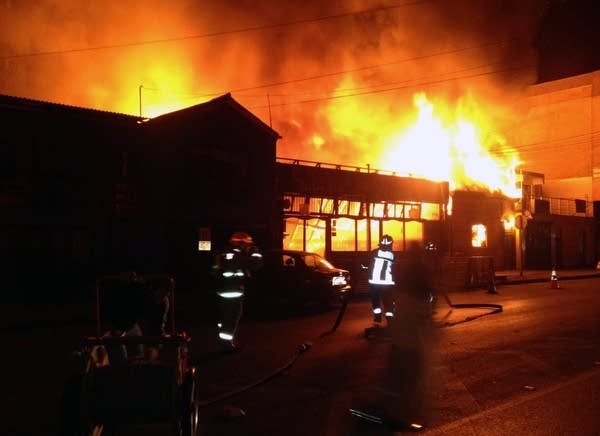Chile lifts tsunami warning after quake kills 6

Go Deeper.
Create an account or log in to save stories.
Like this?
Thanks for liking this story! We have added it to a list of your favorite stories.
Authorities lifted tsunami warnings for Chile's long coastline early Wednesday after a magnitude-8.2 earthquake struck the South American nation's northern coast. Six people were crushed to death or suffered fatal heart attacks, a remarkably low toll for such a powerful shift in the Earth's crust.
The extent of damage from Tuesday night's quake couldn't yet be fully assessed, President Michelle Bachelet said, but she wasn't taking any chances. She declared a state of emergency in the region and sent a military plane with 100 anti-riot police to join 300 soldiers deployed to prevent looting and round up escaped prisoners.
Thousands were evacuated from low-lying areas, but most began to return home as the tsunami alerts were lifted along Chile's long coast.
The shaking touched off landslides that blocked roads, knocked out power for thousands, damaged an airport and started fires that destroyed several businesses. About 300 inmates escaped from a women's prison in the city of Iquique, forcing the closure of the border with Peru. Officials said some two dozen had been captured early Wednesday.
Turn Up Your Support
MPR News helps you turn down the noise and build shared understanding. Turn up your support for this public resource and keep trusted journalism accessible to all.
In Arica, another city close to the quake's offshore epicenter, hospitals treated minor injuries, and some homes made of adobe were destroyed, authorities said. Mining in Chile, which is the world's top copper producing nation, was not affected, although world prices for the red metal jumped as the quake raised supply concerns because most of the Chilean mining industry is in the northern regions.
Chile's Navy lifted tsunami warnings for all of Chile long coastline at around 7 a.m. local time (11 a.m. GMT). The mandatory evacuation orders had remained in effect until nearly dawn for coastal areas north of Antofagasta, a decision backed by the Pacific Tsunami Warning Center in Hawaii, regarding the coastline of Chile as still dangerous.
Bachelet, who just returned to the presidency three weeks ago, spoke well after midnight, five hours after the quake struck and flew to quake-hit regions on Wednesday morning to assess the damage.
It was not lost on many Chileans that the last time she presided over a major quake, days before the end of her 2006-10 term, her emergency preparedness office prematurely waved off a tsunami danger. Most of the 500 dead from that magnitude-8.8 tremor survived the shaking, only to be caught in killer waves in a disaster that destroyed 220,000 homes and washed away large parts of many coastal communities.
"The country has done a good job of confronting the emergency. I call on everyone to stay calm and follow the authorities' instructions," Bachelet tweeted after Tuesday night's temblor.
She said her interior minister would monitor the tsunami threat throughout the night and coordinate the emergency response. "Classes have been suspended, and we will be able to know the extent of the damage in the light of day," she added.
The tsunami warning center initially had cancelled tsunami watches for areas other than northern Chile and southern Peru. The only U.S. impact might be higher waves Wednesday for Hawaii's swimmers and surfers, it said.
The U.S. Geological Survey initially reported the quake at 8.0, but later upgraded the magnitude of the temblor centered 61 miles (99 kilometers) northwest of Iquique. More than 20 significant aftershocks followed, including one of magnitude 6.2.
Psychiatrist Ricardo Yevenes said he was with a patient in Arica when the big one hit.
"It quickly began to move the entire office, things were falling," he told local television. "Almost the whole city is in darkness."
The quake was so strong that the shaking experienced in Bolivia's capital about 290 miles (470 kilometers) away was the equivalent of a magnitude-4.5 tremor, authorities there said.
Chile is one of the world's most earthquake-prone countries because just off the coast, the Nazca tectonic plate plunges beneath the South American plate, pushing the towering Andes cordillera to ever-higher altitudes.
The latest activity began with a strong magnitude-6.7 quake on March 16 that caused more than 100,000 people to briefly evacuate low-lying areas. Hundreds of smaller quakes followed in the weeks since, keeping people on edge as scientists said there was no way to tell if the unusual string of tremors was a harbinger of an impending disaster.
Dear reader,
Your voice matters. And we want to hear it.
Will you help shape the future of Minnesota Public Radio by taking our short Listener Survey?
It only takes a few minutes, and your input helps us serve you better—whether it’s news, culture, or the conversations that matter most to Minnesotans.



